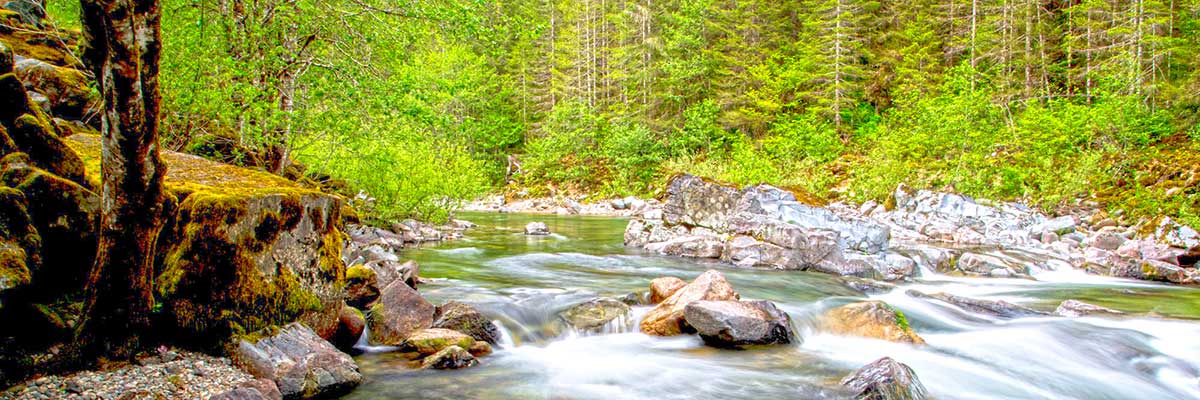
Our History
Watch our short film commemorating WELC’s 20 years (1993-2013) defending the West!
In the early 1970s, with the Cuyahoga River aflame in downtown Cleveland and the toxic Love Canal unearthed in New York, Congress passed and President Nixon signed our bedrock environmental laws to protect clean water and air, to address the hazards of toxic substances and the industrial legacy of using our lands and waters as disposal sites for these poisons, to protect our most at risk plants and animals, and to require all federal agencies to consider the environmental impacts of their decisions. A unique, and critical provision of these laws was the right for everyday people to enforce them against violators.
Out West in 1976, professor Frank Berry at the University of Oregon School of Law formed the first environmental law clinic in the nation. It grew to include professor John Bonine and in 1981 added a recent graduate, Mike Axline. Bonine and Axline together used these laws and the citizen suit provision to provide free legal representation to grassroots conservation organizations across the western U.S. By the early 1980s, the clinic was stopping Air Force bomber flights over ranches and wilderness areas, forcing disclosure of toxic chemicals in household products, and holding polluters accountable to the law.
However, the clinic’s relationship with the University of Oregon was forever changed in 1987 when its law students, together with the Sierra Club Legal Defense Fund, challenged Oregon timber sales to protect the endangered northern spotted owl.
In response, the timber industry launched an unprecedented attack on the University of Oregon Law School’s academic freedom. Through industry allies in the Oregon legislature, a resolution was introduced to close down not just the environmental clinic, but the entire law school, if the clinic was not disbanded. In 1993, the environmental law clinic voluntarily moved off campus and became the Western Environmental Law Center.
Our case over the fate of the endangered spotted owl and the Pacific Northwest’s ancient forests set a new precedent for environmental protection. By advocating for national forest management based on the unique needs of a bioregion rather than one-size-fits-all management, WELC sparked the creation of the groundbreaking Northwest Forest Plan – the first regional ecosystem-based management plan in the nation.
Since 1993, WELC has expanded its offices across the West, first to New Mexico and then to Montana and Washington. We have helped bring Mexican wolves back to the Southwest, protected northern spotted owls and the Pacific Northwest’s ancient forests, shielded Canada lynx from trapping, and stopped the federal government from betraying the wolverine for political reasons.
We have protected free-flowing rivers from the Rio Grande in New Mexico to the Rogue River in Oregon. We helped the Assiniboine and Gros Ventre Tribes fight against gold mines on their ancestral lands in Montana over repeated cyanide spills, and we helped numerous other communities fight against toxic discharges from factory farms and industrial polluters, including brokering a historic agreement with Los Alamos National Laboratory to address nuclear and other hazardous waste. We protected the 102,000-acre Valle Vidal in New Mexico from coalbed methane drilling forever, stopped polluting field burning in Oregon’s Willamette Valley, and protected clean water from coal mine pollution in Montana.
At WELC, we work every day to ensure those who would harm our public lands, our drinking water, wildlife, and communities are held accountable to U.S. law. Without watchdogs like ourselves and our partners, the laws meant to protect our values would be powerless. As we face climate change, our fight toward more resilient natural systems and communities is more important than ever.
We have also grown during this time, both in size and in influence. We now play a key role in the future of the western U.S. by identifying and advocating for forward-thinking environmental policies and to credibly counter our opposition’s efforts through targeted, vigilant legal advocacy. Our well-established litigation capacity provides us with a strong foundation and the credibility to leverage existing political dynamics in favor of conservation through a powerful combination of litigation, administrative-level legal advocacy, and policy advocacy.
Since the Oregon legislature and timber industry’s attack on the University of Oregon’s environmental law clinic, the Western Environmental Law Center has provided pro bono legal services to hundreds of conservation groups and individuals.
